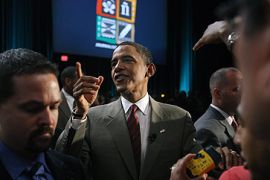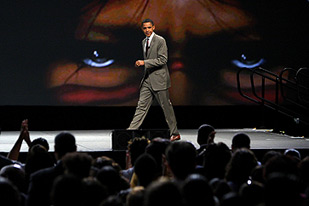Obama lays out policy priorities
Afghanistan, Iran and US economy to be main areas of Democratic candidate’s focus.

 |
| Obama said Afghanistan is a huge problem that the US ‘has to get right’ [AFP] |
One day after finishing his trip to Europe and the Middle East, Barack Obama has said “fighting terrorism in Afghanistan” would be among his key areas of focus as US president.
Keeping Iran from developing nuclear weapons and shoring up the US economy are also top priorities, the presumed Democratic presidential candidate told a gathering of nearly 5,000 journalists from a variety of ethnic backgrounds in his hometown of Chicago, Illinois, on Sunday.
Afghanistan is a “huge problem” that the US “has to get right”, Obama told the Unity: Journalists of Colour conference in his first public appearance since his overseas trip.
He linked that priority to the withdrawal of US troops in Iraq, forces that he said could be better used in Afghanistan.
Rival John McCain, Republican presidential candidate, has repeatedly criticised Obama for calling for the withdrawal of American troops from Iraq over a 16-month period.
But Obama responded to the criticisms on Sunday by saying the US faces more pressing concerns both internationally and domestically.
“We can’t keep spending $10bn a year in Iraq when we have issues at home.
Democrat lead
A new Gallup poll suggests that Obama’s political campaign is on track – he leads McCain by nine popularity percentage points.
| Obama conference excerpts |
|
Q: Would your administration issue an apology to native Americans for the atrocities they’ve endured for the past 500 years? I personally would want to see our tragic history or the tragic elements of our history acknowledged. When it comes to our treatment of Native Americans as well as other persons of colour in this country, we’ve got some very sad and difficult things to account for … I want to set up an annual meeting with them and make sure a whole range of these issues are addressed. The most important thing for the US government to do is not just to offer words, but to offer deeds. When you look at the situation on tribal lands, by every socio-economic indicator, Native Americans are doing worse than every other group – education, unemployment … I have to confess I am more concerned about delivering a better life. Q: Should we have more immigration or less immigration? A: We are a nation of immigrants and we are a nation of laws. The problem is not the number of immigrants coming in …The problem is when we’ve got a legal immigration system running parallel with an illegal immigration system. Q: You have visited churches and synagogues. When will you, or is it in the plans for you to, visit a mosque? This is an example of a no-win situation. I have repeatedly said I’m not a Muslim but this whole strategy of questioning that I am is indicative of anti-Muslim sentiment. I just don’t like the idea of somebody falsely identifying my religion. When it comes to anti-Muslim bias, when it comes to discrimination against Muslims or Arab Americans, I have been at the forefront of those fights and will continue to be when I’m president of the United States. |
On the question of economy, Obama said he would meet a group of economists this week to work on short- and long-term solutions to help those affected by the increasingly dismal US economy.
During Sunday’s session, Obama listened to questions about immigration reform and affirmative action.
At times, when pressed on the extent of his international diplomatic experience and his relationship with Muslims, Obama went on the defensive.
“I was puzzled by this notion that somehow what we were doing was in any way different from what Senator McCain or a lot of presidential candidates have done in the past.
“Now, I admit we did it really well,” Obama told amused journalists when asked about criticism that he may have come across as though he was running for “president of the world”.
Despite Republican criticisms, the majority of Sunday’s audience with Obama were impressed with his detailed answers, but some said they wanted more specifics on other topics, like offering reparations to Native Americans.
“I thought he handled himself well,” William Moore, a professor at Ohlore College in Fremont, California, told Al Jazeera.
“Everyone has to make reparations to the American Indians,” he said.
“We took their country and we’re still not paying any rent. It’s a tricky thing but certainly what’s going on in any reservation – Indians are still in really bad shape.”
McCain was also invited to the convention but declined, citing scheduling problems.
In an interview with ABC television broadcast on Sunday, McCain said Obama “doesn’t understand what’s at stake” in Iraq, referring to Obama’s continuing call for the withdrawal of US forces from Iraq within 16 months of taking office.
“He chose to take a political path that would have helped him get the nomination of his party. … And if we’d done what Senator Obama wanted done, it would have been chaos, genocide, increased Iranian influence, perhaps al-Qaeda establishing a base again,” McCain said.
During a town hall meeting last week in New Hampshire, McCain said that Obama “would rather lose a war in order to win a political campaign”.